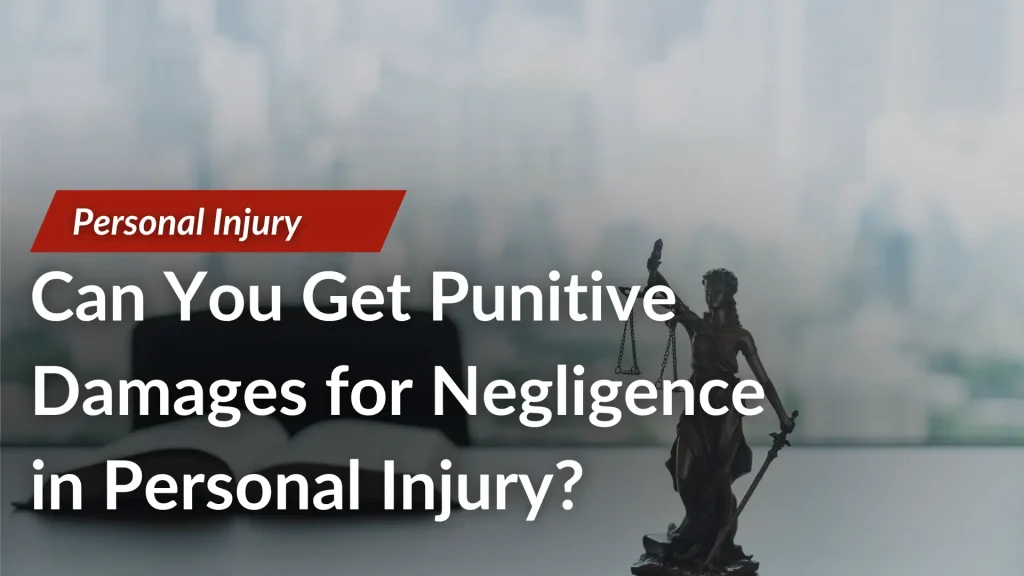 Most personal injury cases in Florida result in the plaintiff receiving compensatory damages from the defendant. But can you also seek punitive damages for negligence? The answer is yes, but only under specific circumstances.
Most personal injury cases in Florida result in the plaintiff receiving compensatory damages from the defendant. But can you also seek punitive damages for negligence? The answer is yes, but only under specific circumstances.
Florida sets a high bar for awarding punitive damages in injury cases, which is why they’re rare. However, with sufficient evidence, you can seek these damages, and if awarded, they can significantly increase the compensation you receive.
What Are Punitive Damages?
Punitive damages are a rare type of financial compensation awarded in personal injury cases. Unlike compensatory damages, punitive damages are not meant to compensate the victim for the injuries they sustained. Instead, they punish the defendant for their particularly egregious actions.
Punitive damages don’t just punish the defendant for their actions. They also serve to deter the defendant and others from engaging in similar actions in the future. Someone may be less likely to put others around them at risk of harm if they know they may have to pay hundreds of thousands of dollars.
Compensatory damages include both economic and non-economic damages. Economic damages cover the plaintiff’s tangible losses, such as medical bills and lost wages. Non-economic damages cover their intangible losses, such as the pain and suffering they experienced.
Punitive damages don’t involve the plaintiff and what they experienced. The basis for these damages is the defendant’s mindset leading up to and during the incident. Did they know their actions were likely to cause harm, and did they choose to take those actions despite this knowledge?
When Are Punitive Damages Awarded in Florida?
Florida courts only award punitive damages in specific cases. First, the plaintiff must petition the court to seek punitive damages. Then, they must prove that the defendant’s conduct went beyond simple negligence and into the realm of intentional misconduct or gross negligence.
Intentional Misconduct and Gross Negligence
Only the jury can determine if the defendant’s actions qualify as intentional misconduct or gross negligence, and they must do so based on “clear and convincing evidence.” Florida’s laws define intentional misconduct and gross negligence as:
- Intentional misconduct occurs when the defendant knowingly engages in behavior that is likely to cause harm. For example, if a driver intentionally drives through a crowded sidewalk, they know there is a high likelihood that their actions will cause harm.
- Gross negligence involves conduct that is so reckless or careless that it shows a blatant disregard for the safety and rights of others. An example might be if a manufacturer knowingly uses unsafe materials when making a product, resulting in consumer injuries.
Ordinary negligence, which is a failure to exercise reasonable care, does not meet the threshold for punitive damages. The defendant’s actions must be due to more than a simple mistake or oversight.
How Does Florida Calculate Punitive Damages?
Florida doesn’t have specific rules for calculating punitive damages. However, it does have specific rules on punitive damage caps. In personal injury cases, three possible punitive damage caps could apply:
- Compensatory Damages Multiplier – The first amount of punitive damages cap is three times the amount of compensatory damages awarded. For example, if your compensatory damages were $75,000, the punitive damages would max out at $225,000.
- Set Damages Cap – The second damages cap is a set maximum of $500,000. Multiplying the compensatory damages by three cannot exceed this cap. Even if your compensatory damages were $250,000, the punitive damage cap would be $500,000 instead of $750,000.
- No Damages Cap – If the defendant had specific intent to harm you and did harm you, then there is no cap on punitive damages. An example of a situation that would fall into this category is if the defendant intentionally assaulted you specifically.
The caps on punitive damages exist to balance the need to punish wrongful behavior with the goal of avoiding excessive financial penalties.
Evidence Required When Seeking Punitive Damages

To successfully claim punitive damages in Florida, you must present clear and convincing evidence of the defendant’s intentional misconduct or gross negligence. This is a higher standard of proof than what compensatory damages require, which means your evidence must be exceptional.
An experienced Florida personal injury attorney can assist you in gathering the necessary evidence for a punitive damages claim, including:
- Witness Testimony – Testimony from individuals who observed the defendant’s behavior and actions can be crucial in proving intentional misconduct or gross negligence. On its own, witness testimony isn’t the best form of evidence. However, when it aligns with other pieces of evidence, it can bring a case together.
- Expert Witnesses – Your attorney may hire expert witnesses to testify about industry standards and how the defendant’s actions deviated from those standards. Expert witnesses are common in product liability cases but can also play a vital role in other injury cases.
- Documentation – Emails, text messages, social media posts, and other forms of written or digital documentation can show that a defendant was aware of the risks associated with their actions but chose to ignore them.
- Past Conduct – Evidence of the defendant’s previous behavior or a pattern of similar misconduct may be relevant in establishing if their actions count as intentional misconduct or gross negligence. For example, if your neighbor had a history of threatening violence before one day assaulting you.
Due to the high standard for seeking punitive damages, working with a knowledgeable personal injury attorney who can gather the necessary evidence for your case is essential.
Contact a Florida Personal Injury Attorney Today
If you believe the court should award punitive damages in your personal injury case, you need an experienced Florida personal injury attorney on your side. These cases require a thorough understanding of Florida law and the ability to gather and present compelling evidence.
Contact our law firm at (619) 233-5020 or through our online form for a free consultation. We’ll evaluate your case, explain your legal rights and options, and determine whether to seek punitive damages in your claim. We’re here to manage this process for you so you can focus on healing. Check out our awards and recent results to know why you should trust us.
Related Posts:
What Are Average Daycare Negligence Settlement Amounts in Florida?
Can You Get Punitive Damages for Negligence in Personal Injury?


